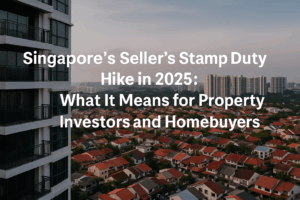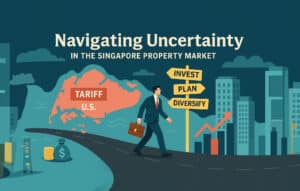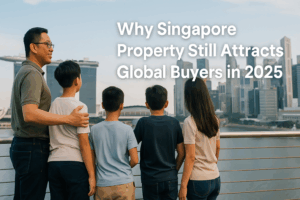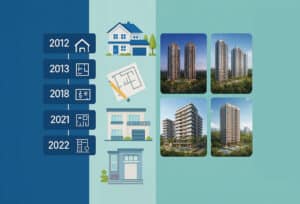A deep dive across New Launches, Private Homes, HDB, Luxury, and Commercial segments
April 2025 saw global markets thrown into turmoil by a bombshell announcement: the U.S. imposed sweeping tariffs on global imports, reigniting trade war fears and sending stock markets tumbling from Wall Street to Asia. In case you missed it, Singapore’s Prime Minister Lawrence Wong recently weighed in on the implications, underscoring the challenges ahead for a trade-reliant nation like ours.
With Singapore’s economy deeply intertwined with global trade, property buyers and investors are now asking a critical question: How will these tariffs affect Singapore’s real estate market in the short term and over the long haul? At PropertyNet.SG, we’ve closely examined every major property segment—New Launches, Private Resale, HDB, Luxury, and Commercial—to provide you with clear, actionable insights. We aim to help you navigate this wave of global uncertainty and make smarter real estate decisions.
Economic Context: Why It Matters
The fallout from these tariffs is already reshaping Singapore’s economic outlook. The Monetary Authority of Singapore (MAS) has signaled a more dovish approach, with analysts anticipating monetary easing to soften the blow. Growth forecasts for 2025 have been pared back to around 2%, reflecting tempered expectations, while inflation has cooled significantly.
New Launch Segment: Developers Watch Closely
Short-term outlook:
New launches in Q1 2025 recorded healthy interest, supported by easing mortgage rates. However, the post-tariff announcement climate has led developers to slow launch schedules and adopt a “phase-by-phase” approach.
Buyers are also becoming more selective, especially in higher-quantum segments. The URA flash estimate showed a price increase of just 0.6% in Q1, a significant moderation from the last quarter.
Developer strategy ahead:
- Launch timing will be more tactical
- Expect attractive early bird discounts
- Developers are unlikely to slash prices drastically due to high land and construction costs
Long-term outlook:
If trade tensions persist and a global slowdown takes hold, developers may reduce land bidding activity, keeping overall supply tight. However, this also sets the stage for a future rebound once global sentiment recovers, creating opportunities for buyers to enter during a soft cycle.
Want to explore the latest projects? Visit our new condo launches page for up-to-date options and insights.
Private Resale Homes: Stable for Now, But Pacing Slows
Short-term impact:
The private resale market remains supported by local demand, particularly from HDB upgraders. According to URA, price movements have been moderate – again, +0.6% in Q1 2025.
However, transaction volumes have dipped slightly as buyers adopt a wait-and-see approach, especially for larger units and CCR properties.
Mortgage relief:
With mortgage interest rates easing to around 2.5%–2.75%, buyers enjoy better affordability compared to the peak of 2024. MAS is expected to allow a weaker Singapore dollar to support exports, which could indirectly sustain low borrowing costs.
Long-term impact:
If global growth slows further, resale activity may remain subdued, but price corrections are unlikely due to tight supply and continued local interest. Once the economy finds footing, pent-up demand could return, especially in city fringe and suburban areas.
HDB Resale Market: Steady As She Goes
Short-term:
HDB resale prices continue to climb, albeit at a gentler pace—1.5% growth in Q1 2025, according to PropNex estimates.
Transaction volumes are slightly down, partly due to recent BTO launches and cautious upgrading sentiment. However, core demand remains firm, underpinned by:
- CPF housing grants
- HDB concessionary loans (fixed at 2.6%)
- Marriage, family, and essential living needs
Long-term:
Barring a major local employment shock, the HDB market should stay resilient. PropNex projects a 5–7% growth in resale prices this year – slower than in 2024 but still solid.
A stable HDB market also serves as a strong feeder for future upgraders to the private segment, supporting the entire ecosystem.
Luxury Segment: Foreign Buyers Hit Pause
Short-term impact:
The luxury market – especially prime CCR condos and Good Class Bungalows – is more exposed to external sentiment. Following the tariff news, foreign investors (especially from China and the U.S.) have turned cautious.
Foreign buying was already muted due to the high 60% ABSD for foreigners. With heightened market uncertainty, transaction volumes for high-end units may dip further in the coming months.
But here’s the twist:
Singapore’s position as a safe haven remains compelling. UHNWIs (ultra-high-net-worth individuals) may take this chance to enter selectively, especially if the Singapore dollar weakens slightly.
Long-term outlook:
As global markets stabilize, the luxury segment will likely benefit from renewed capital inflows. Foreign family offices and global wealth hubs continue to eye Singapore for diversification and security.
Commercial Property: Sector-by-Sector Analysis
Office:
Leasing sentiment is softening, with occupiers delaying expansion. CBRE forecasts 2% rental growth in the Grade A CBD segment 2025.
Flight-to-quality continues as tenants move into more efficient, green-certified buildings.
Retail:
Retail is holding up for now, thanks to tourism recovery and low new supply. However, any sharp dip in consumer spending globally could test prime malls and downtown footfall. Suburban malls remain the most defensive.
Industrial/Logistics:
Despite global trade risks, industrial space is seeing stable demand. A large portion of upcoming warehouse supply has already been pre-committed. Singapore’s role in diversified supply chains continues to underpin this segment.
Investor outlook:
Investment activity is still healthy, especially in defensive asset classes. Lower interest rates may keep yields attractive for long-term players, especially institutional investors and REITs. For the latest opportunities, check out our new commercial and industrial launches to stay ahead of the curve.
Final Word: Stay Grounded, Stay Informed
While the U.S. tariffs have introduced new global risks, Singapore’s property market remains fundamentally strong.
Short-term risks include:
- Buyer hesitancy in high-quantum segments
- Slower transaction volumes
- Softer foreign investment
But medium- to long-term resilience comes from:
- Sound government policies
- Stable employment
- Easing mortgage rates
- Sustained local housing demand
At PropertyNet.SG, these market shifts offer selective opportunities – whether you’re a first-time buyer, upgrader, or investor. Staying informed, assessing your financial readiness, and taking a long-term view will always put you in the best position. If you’re ready to transform challenges into opportunities, arm yourself with our insightful guide, Navigating Tariff Uncertainty in the Singapore Property Market: A Practical Guide for Buyers and Investors. Let’s embark on this journey together and unlock the potential within the market!
🚀 Stay Ahead in the Property Market!
Be the first to receive exclusive updates, launch reviews, insider deals, and real-time alerts — directly on your preferred app.
👉 Join our community now:
🌐 Spread Knowledge. Share with Others.
Click any of the icons below to share this content with those who may benefit from it.







